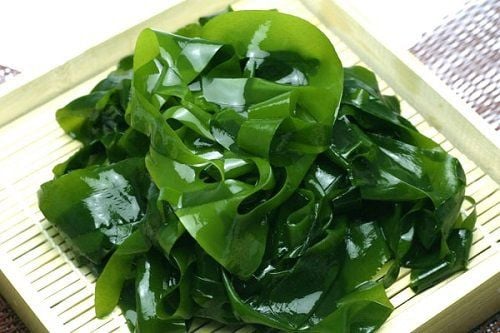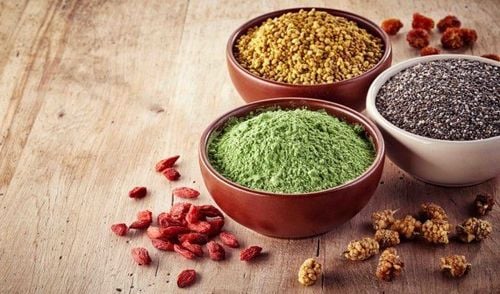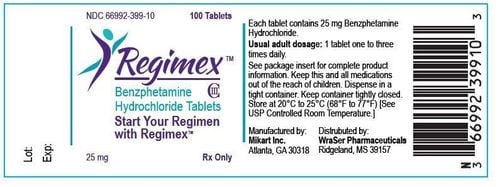This is an automatically translated article.
Seaweed is a species of algae, a marine plant that grows along rocky coastlines around the world and comes in many different varieties. Each type of seaweed has certain flavors and health benefits. However, is it good to eat seaweed every day? always get everyone's attention.1. Learn about seaweed
Seaweed is a common ingredient in many Asian dishes, especially in sushi, salads, soups and stews.Although it is not as popular in the United States as it is in Asian countries, people are starting to realize that seaweed is a nutritious addition to the diet and offers a number of health benefits such as : Eat seaweed soup to lose weight and help strengthen the immune system. ..
In most types of seaweed contain nutrients such as: Vitamin A, vitamin B1, vitamin B2, vitamin C, vitamin E, vitamin K, calcium, folate, potassium, manganese, copper...
Also Seaweed is an excellent source of nutrients that promote thyroid health thanks to its content of iodine, an important trace mineral. Because the body can't make iodine on its own, you need to get it from food sources or supplements.
2. Is eating seaweed fat?
"Is eating seaweed fat?" . In fact, seaweed can help you lose weight. Because seaweed contains a lot of fiber, does not contain calories, helps you reduce hungerFiber in seaweed slows down the emptying of the stomach, helps you feel full longer and can delay hunger. This plant also has anti-obesity effects. In particular, some animal studies suggest that a substance in seaweed called fucoxanthin may help reduce body fat. So, for the question "Is it fat to eat seaweed?" then the answer is no. On the contrary, this food also has the effect of supporting weight loss and should be added to the diet.

Ăn rong biển có béo không là thắc mắc của nhiều người
3. Other benefits of seaweed
3.1. Improves thyroid function The thyroid gland plays an important role in overall health. On the other hand, iodine is an essential micronutrient for thyroid hormone synthesis. Insufficient iodine thyroid cannot produce enough thyroid hormone causing hypothyroidism.Also, if you don't get enough iodine, you can get goiter. Iodine deficiency can also affect children during their development even while in the womb.
3.2. May improve gut health Seaweed contains substances such as carrageenans, agars, fucoidan, non-digestible fiber, which supports the growth of beneficial bacteria in the digestive tract.
In addition, sulfated polysaccharides (i.e. sugars found in seaweed) promote the growth of good bacteria and a short-term increase in fatty acids that help keep the lining of the intestines healthy.
3.3. Improves heart health Some studies show that eating seaweed can help lower blood pressure, lower LDL cholesterol and total cholesterol levels.
3.4. Stabilizes blood sugar Brown seaweed contains fucoxanthin. This is an antioxidant that gives vegetables their color. Antioxidants may play a role in helping to improve blood sugar control and reduce the risk of developing type 2 diabetes.
3.5. Boosts Immune System Some studies show that seaweed can help boost the immune system by fighting viruses and preventing them from entering the body.
3.6. Reducing the risk of cancer Adding seaweed to the diet may help reduce the risk of developing certain types of cancer. Because the ingredients in seaweed can reduce estrogen levels, preventing the risk of breast cancer.

Ăn canh rong biển giảm cân rất hiệu quả và được nhiều chị em yêu thích
4. Is it good to eat seaweed every day?
Eating fresh seaweed is generally considered safe for most people. Although this type of algae offers many health benefits, according to experts, you should not eat too much seaweed every day. Specifically:Seaweed contains a lot of iodine: While iodine is an important trace mineral for thyroid health, eating too much can be counterproductive. Seaweed can increase the side effects of some medications: Seaweed contains large amounts of potassium, which can be harmful to people with kidney disease. Besides, this plant contains high levels of vitamin K, which in many cases will interfere with blood-thinning drugs like Warfarin. High in Heavy Metals: Some types of seaweed may contain high levels of arsenic, cadmium, mercury, or lead.
5. Some ways to eat seaweed enhance nutrition
There are many ways to add seaweed to the diet such as:Make a kombu dried kelp soup broth Mix fresh mixed with vinegar, sesame oil, scallions and garlic to make a seaweed salad Fresh seaweed cooked with beans and eggs Making sushi Thus, the above article has helped readers answer the question "Is eating seaweed fat?". In the diet you can consider adding a sufficient amount of seaweed to your daily meal.
Please dial HOTLINE for more information or register for an appointment HERE. Download MyVinmec app to make appointments faster and to manage your bookings easily.
Reference sources: Webmd.com, Healthline.com












